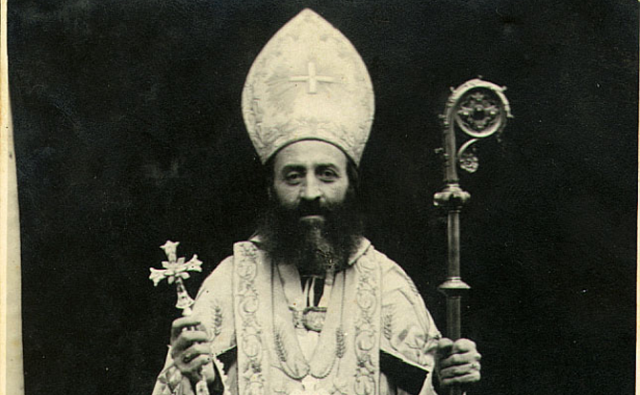Bishop Slaughtered for Refusing to Convert to Islam to be Beatified
Nowadays Bishop Flavien-Michel Malké’s feckless successors among the U.S. Catholic bishops bow and scrape before the children and heirs of those who killed him, silencing those who speak out about the Muslim persecution of Christians and consigning today’s new martyrs to their fate, sacrificing them on the altar of their fruitless, delusional and self-defeating quest for “dialogue” with Muslims.
How many Christians has that “dialogue” prevented from being persecuted or martyred? Why, absolutely none, of course. But the comfortable suburban Church continues on its comfortable suburban way, secure in its illusions and delusions.
One day, however, the truth it has so assiduously endeavored to ignore, deny and suppress will dawn upon it with undeniable and terrifying reality, and maybe some of those bishops will realize how ill they served their people by enforcing and reinforcing their ignorance and complacency.
“Syriac Bishop Will Be Beatified on the 100th Anniversary of His Martyrdom (832),” National Catholic Register, August 11, 2015:
DIYARBAKIR, Turkey — On Saturday, Pope Francis approved a decree recognizing the martyrdom of Flavien-Michel Malké, a Syriac Catholic bishop who was killed in 1915, amid the Ottoman Empire’s genocide against its Christian minorities.
The decision was made during an Aug. 8 meeting between Pope Francis and Cardinal Angelo Amato, prefect of the Congregation for the Causes of Saints.
Bishop Malké will be beatified Aug. 29, the 100th anniversary of his martyrdom, during a liturgy celebrated by Ignatius Youssef III Younan, the Syriac patriarch of Antioch, at the convent of Our Lady of Deliverance in Lebanon. It is expected that thousands of Syrians and Iraqis displaced by the Islamic State will attend the beatification.
“In these painful times experienced by Christians, especially the Syriac communities in Iraq and Syria, the news of the beatification of one of their martyrs, will surely bring encouragement and consolation to face today’s trials of appalling dimension,” read an Aug. 9 statement of the Syriac Patriarchate of Antioch.
“Blessed Martyr Michael, intercede for us, and protect especially the Christians in the Orient and all the world in these hard and painful days.”
Malké was born in 1858 in the village of Kalaat Mara, a village of the Ottoman Empire in what is now Turkey, to a Syriac Orthodox family. He joined a monastery of that Church and was ordained a deacon, but then converted to the Syriac Catholic Church. (Both the Syriac Orthodox and Syriac Catholics use the West-Syrian rite.)
After his conversion, he was ordained a priest in Aleppo in 1883. He was a member of the Fraternity of St. Ephrem and served parishes in southeastern Turkey, near his home.
Ottoman persecution of Christians began in earnest with the Hamidian massacres of 1894-1897. Malké’s church and home were sacked and burned in 1895, and many of his parishioners were murdered, including his mother. In total, the massacres killed between 80,000 and 300,000 Christians.
He was selected to become a bishop in the 1890s, serving as a chorbishop and helping in the rebuilding of Christian villages. In 1913, he was consecrated bishop and appointed head of the Syriac Diocese of Gazireh (modern-day Cizre, 150 miles southeast of Diyarbakir).
A second round of persecution of Christians in the Ottoman Empire began in April 1915. Known as the Armenian Genocide, it targeted the Armenian, Assyrian and Greek Christian minorities in the empire. The Assyrian genocide (the portion of the mass killings directed against Syriac and Chaldean Christians) is also known as the Seyfo Massacre, from the Syriac word for sword.
Some 1.5 million Christians were killed, and millions more were displaced during the genocide.
During the summer when the genocide broke out, Bishop Malké was in the Idil district, near Gazireh. In June 1915, hearing the Ottoman forces were preparing to massacre Gazireh’s people, he returned.
According to the Syriac Patriarchate, when his friends and acquaintances urged him to withdraw from Gazireh to a safer location, he replied, “Even my blood I will shed for my sheep.”
Together with four of his priests and the Chaldean bishop of Gazireh, Philippe-Jacques Abraham, he was arrested and imprisoned for two months.
Bishop Malké refused to convert to Islam, and on Aug. 29, 1915, he was martyred.
He was the last Syriac bishop of Gazireh; after his death, the diocese was suppressed, and, today, the Syriac Catholic Church has no presence in Turkey.
In an Aug. 8 interview with Vatican Radio, the postulator of Bishop Malké’s cause, Father Rami Al Kabalan, spoke of the bishop’s deep spiritual life as well as the relevance his martyrdom has today.
The bishop, he said, “played a fundamental role in encouraging people to defend their faith in the difficulties of the time, during the persecutions of the Ottoman Empire.”
Bishop Malké lived a life of poverty, even selling his liturgical vestments in order to assist the poor and help fight poverty, Father Al Kabalan said.
In addition to his closeness with the poor, the priest said that Bishop Malké was extremely zealous in his apostolate and visited all of the parishes within his diocese.
One of the bishop’s most striking phrases, his postulator said, comes from when he was pressured to renounce the faith and to convert to Islam. Rather than giving in, the bishop replied, “I will defend my faith to the blood.”…

